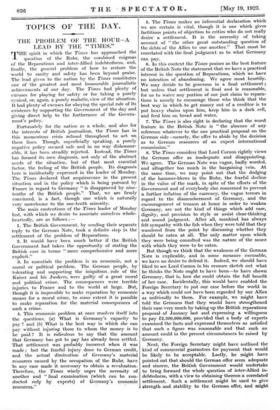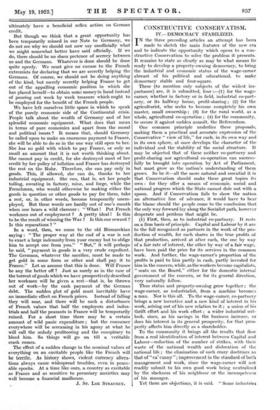TOPICS OF THE DAY.
THE PROBLEM OF THE HOUR--A LEAD BY THE "TIMES."
THE spirit in which the Times has approached the question of the Ruhr, the combined enigmas of the Reparations and inter-Allied indebtedness, and, finally, the general problem of how to restore the world to sanity and safety has been beyond praise. The lead given to the nation by the Times constitutes one of the greatest and most honourable journalistic achievements of our day. The Times had plenty of excuses for playing for safety or for taking a purely cynical, or, again, a purely realistic, view of the situation. It had plenty of excuses for obeying the special rule of its existence by supporting the Government of the day and giving direct help to the furtherance of the Govern- ment's policy.
Fortunately for the nation as a whole, and also for the interests of British journalism, the Times has in this momentous crisis refused throughout to act on these lines. Though, superficially speaking, a purely negative policy seemed safe and in no way dishonour- able, it has been steadily rejected. Instead, the Times has formed its own diagnosis, not only of the abstract needs of the situation, but of that most essential factor, the feeling of the British people. Its diagnosis here is incidentally expressed in the leader of Monday. The Times declared that acquiescence in the present situation and in the policy which is being pursued by France in regard to Germany " is disapproved by nine- tenths of the British people." That, we are firmly convinced, is a fact, though one which is naturally very unwelcome to the one-tenth minority.
The main contentions of the Times leader of Monday last, with which we desire to associate ourselves whole- heartedly, are as follows :- 1. The British Government, by sending their separate reply to the German Note, took a definite step in the settlement of the problem of Reparations.
2. It would have been much better if the British Government had taken the opportunity of stating the British case in terms " more comprehensive and more explicit."
3. In essentials the problem is an economic, not a moral or political problem. The German people, by tolerating and supporting the iniquitous . rule of the Kaiser and his Junkers, were guilty of a great moral and political crime. The consequences were terrible injuries to France and to the world at large. But, though it is impossible to make reparation by economic means for a moral crime, to some extent it is possible to make reparation for the material consequences of such a crime.
4. This economic problem at once resolves itself into the questions, (a) What is Germany's capacity to pay ? and (b) What is the best way in which she can pay without injuring those to whom the money is to be paid ? It is ridiculous to say that the amount that Germany has got to pay has already been settled. That settlement was probably incorrect when it was made ; but the fearful injury done to German credit, and the actual diminution of Germany's material resources caused by the occupation of the Ruhr, have in any case made it necessary to obtain a revaluation. Therefore, the Times wisely urges the necessity of another and " final examination (which can be con- ducted only by experts) of Germany's economic resources." 5. The Times makes an inferential declaration which we are certain is vital, though it is one which gives factitious points of objection to critics who do not really desire a settlement. It is the necessity of taking account of " the other great outstanding question of the debts of the Allies to one another." That must be correlated with the final judgment as to what Germany can pay.
6. In this context the Times praises as the best feature of the British Note the statement that we have a practical interest in the question of Reparations, which we, have no intention of abandoning. We agree most heartily. We may decide to be generous in a final settlement ; but unless that settlement is final and is reasonable, for us to waive any portion of our just claim to repara- tions is merely to encourage those who think that the best way in which to get money out of a creditor is to put heavy chains upon him, keep him in a dark cell, and feed him on bread and water.
7. The Times is also right in declaring that the worst feature in the British Note is ".the absence of any reference whatever to the one practical proposal on the German side—namely, the offer to abide by the decision as to German resources of an expert international commission."
8. The Times considers that Lord Curzon rightly views the German offer as inadequate and disappointing. We agree. The German Note was vague, badly worded, and altogether too much in the bargaining vein. At the same time, we may point out that the dodging of the hammer-blows in the Ruhr, the fearful decline in the value of the mark, in spite of the efforts of the Government and of everybody else concerned to prevent a further inflation of the currency, the vague terrors in regard to the dismemberment of Germany, and the encouragement of treason at home in order to weaken Germany, are not the kind of things which add ease, dignity, and precision to style or assist clear-thinking and sound judgment. After all, mankind has always felt sympathy with the fish when they were told that they wandered from the point by discussing whether they should be eaten at all. The only matter upon which they were being consulted was the nature of the sauce with which they were to be eaten.
But though we think that the weakness of the German Note is explicable, and in some measure excusable, we have no desire to defend it. Indeed, we should have liked to see Lord Curzon in his censure sketch out what he thinks the Note ought to have been—to have shown Germany, that is, how she could obtain the full benefit of her case. Incidentally, this would have enabled the Foreign Secretary to put our case before the world in a way which could not have been regarded by our Allies as unfriendly to them. For example, we might have told the Germans that they would have strengthened their case very much by taking up the British reparations proposal of January last and expressing a willingness to pay £2,500,000,000, provided that a body of experts examined the facts and expressed themselves as satisfied that such a figure was reasonable and that such an amount could in the present circumstances be raised by Germany.
Next, the Foreign Secretary might have outlined the kind of commercial guarantees for payment that would be likely to be acceptable. Lastly, he might have pointed out that should the German offer seem adequate and sincere, the British Government would undertake to bring forward the whole question of inter Allied in- debtedness, with a view to obtaining thereon a correlated settlement. Such a settlement might be used to give strength and stability to the German offer, and might Ultimately- have a beneficial reflex action on German credit.
But though we think that a great opportunity has been temporarily missed in our Note to Germany, we do not see why we should not now say unofficially what we might somewhat better have said officially. If we do, there should be no sham pretence of secrecy between us and the Germans. Whatever is done should be done quite openly.- We must give no excuse to the French extremists for declaring that we are secretly helping the Germans. Of course, we should not be doing anything of the kind, but merely secretly helping France to get out of the appalling economic position in which she has placed herself—to obtain some money in hand instead of pouring out week by week treasure which ought to be employed for the benefit of the French people.
We have left ourselves little space in which to speak of the purely economic side of the Continental crisis. People talk about the wealth of Germany and of her splendid economic equipment. What does that mean in terms of pure economics and apart from the moral and political issues ? It means that, should Germany be called upon to make an enormous payment to France, she will be able to do so in the one way still open to her. She has no gold with which to pay France, or only so small an amount that it is not worth thinking about. She cannot pay in credit, for she destroyed most of her credit by her policy of inflation and France has destroyed the rest on the Ruhr. Therefore, she can pay only in goods. This, if allowed, she can do, thanks to her industrial equipment. She can, that is, set her people toiling, sweating in factory, mine, and forge, while the Frenchmen, who would otherwise be making either the goods in question or other goods to pay for them, take a rest, or, in other words, become temporarily unem- ployed; But these words- are hardly out of one's mouth when one hears a wild clamour : " What ! Put French -workmen out of employment ? A pretty ideal ! Is this to be the result of winning the War ? Is this our reward ? Is this reparations ? "
In a word, then, we come to the old Bismarckian saying : " The proper way at the end of a war is not to exact a large indemnity from your enemy but to oblige him to accept one from you." " But," it will perhaps be said, " payment in goods is a very crude expedient. The Germans, whatever the sacrifice, must be made to get gold in some form or other and shall pay it to France." Let us assume that this is done. Will France be any the better off ? Just as surely as in the case of the torrent of goods which we have prospectively described her workmen will be given a rest—that is, be thrown out of work—by the cash payment of the German debt. The sudden glut of gold must inevitably have an immediate effect on French prices. Instead of falling they will soar, and there will be such a disturbance of French values that half the employers and indus- trials and half the peasants in France will be temporarily ruined. For a short time there may be a certain amount of wild panic expenditure ; but the consumer everywhere will be screaming in his agony at what he will call the unholy profiteering and the conspiracy to bleed him. So things will go on till a veritable crash comes.
The effect of a sudden change in the nominal values of everything on an excitable people .like the French will be terrific. As history shows, violent currency altera- tions always cause widespread troubles, even in peace- able epochs. At a time like ours, a country as excitable as France and as sensitive to pecuniary anxieties may well become a financial madhouse.
J. ST. LOE STRACHEY.











































 Previous page
Previous page